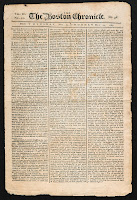Friday, February 27, 2009
New Virtual Exhibit of Law-Related Ephemera
Monday, February 16, 2009
Colonial Boston Newspaper Arrives in the Rare Book Room
 We recently acquired a four-page issue of the Boston Chronicle, a pre-Revolutionary newspaper with Loyalist leanings. The issue is dated Thursday, May 25 to Monday, May 29, 1769. During this period the newspaper reported extensively on the debate between England and the American Colonies on the issue of taxation. The first page of this issue contains a lengthy response to an earlier argument by Dr. Franklin in favor of the Colonies. Here, the author argued that all of England's subjects, wherever they are situated, must pay the taxes ordered by Parliament whether or not the subjects consent to the tax. The paper also contains legal notices, including news of a Philadelphia man who was sentenced to death for rape; a report of a theft from the ship Nancy; creditors' claims against an insolvent man's estate; and a notice of divorce. Other items include announcements of a Wednesday night concert (admission: one-half dollar), news from Philadelphia and London, reports of ships arriving and departing, and notices of sales of wine, clothing, and books.
We recently acquired a four-page issue of the Boston Chronicle, a pre-Revolutionary newspaper with Loyalist leanings. The issue is dated Thursday, May 25 to Monday, May 29, 1769. During this period the newspaper reported extensively on the debate between England and the American Colonies on the issue of taxation. The first page of this issue contains a lengthy response to an earlier argument by Dr. Franklin in favor of the Colonies. Here, the author argued that all of England's subjects, wherever they are situated, must pay the taxes ordered by Parliament whether or not the subjects consent to the tax. The paper also contains legal notices, including news of a Philadelphia man who was sentenced to death for rape; a report of a theft from the ship Nancy; creditors' claims against an insolvent man's estate; and a notice of divorce. Other items include announcements of a Wednesday night concert (admission: one-half dollar), news from Philadelphia and London, reports of ships arriving and departing, and notices of sales of wine, clothing, and books.
Tuesday, February 3, 2009
This Just In: Manuscript Copy of Craig's Ius Feudale
 We recently received a magnificent manuscript copy of Thomas Craig's Ius Feudale from Michael H. Hoeflich. Originally published in 1603, the Ius Feudale solidified the idea of a separate body of Scotch law. It takes its place in our collection alongside other important Scottish legal works such as the Regiam Majestatem.
We recently received a magnificent manuscript copy of Thomas Craig's Ius Feudale from Michael H. Hoeflich. Originally published in 1603, the Ius Feudale solidified the idea of a separate body of Scotch law. It takes its place in our collection alongside other important Scottish legal works such as the Regiam Majestatem. This manuscript, beautifully bound in speckled calf leather with delicate floral borders tooled along the spine, probably dates from the seventeenth century. It was written by an unknown person who had probably gotten hold of an early printed edition of the work, and wanted to make a copy for himself or herself.
We are most grateful to Professor Hoeflich for this remarkable gift.
Subscribe to:
Comments (Atom)


